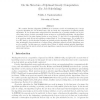Free Online Productivity Tools
i2Speak
i2Symbol
i2OCR
iTex2Img
iWeb2Print
iWeb2Shot
i2Type
iPdf2Split
iPdf2Merge
i2Bopomofo
i2Arabic
i2Style
i2Image
i2PDF
iLatex2Rtf
Sci2ools
109
click to vote
MFCS
2009
Springer
2009
Springer
On the Structure of Optimal Greedy Computation (for Job Scheduling)
We consider Priority Algorithm [BNR03] as a syntactic model of formulating the concept of greedy algorithm for Job Scheduling, and we study the computation of optimal priority algorithms. A Job Scheduling subproblem S is determined by a (possibly infinite) set of jobs, every finite subset of which potentially forms an input to a scheduling algorithm. An algorithm is optimal for S, if it gains optimal profit on every input. To the best of our knowledge there is no previous work about such arbitrary subproblems of Job Scheduling. For a finite S, it is coNP-hard to decide whether S admits an optimal priority algorithm [PR07]. This indicates that meaningful characterizations of subproblems admitting optimal priority algorithms may not be possible. In this paper we consider those S that do admit optimal priority algorithms, and we show that the way in which all such algorithms compute has non-trivial and interesting structural features.
Job Scheduling | MFCS 2009 | Optimal Priority Algorithms | Priority Algorithms | Theoretical Computer Science |
Related Content
| Added | 27 May 2010 |
| Updated | 27 May 2010 |
| Type | Conference |
| Year | 2009 |
| Where | MFCS |
| Authors | Periklis A. Papakonstantinou |
Comments (0)

